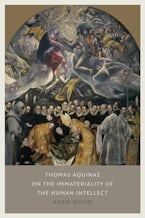- Home
- philosophy
- Thomas Aquinas on the Immateriality of the Human Intellect
Preparing your PDF for download...
There was a problem with your download, please contact the server administrator.
Thomas Aquinas on the Immateriality of the Human Intellect
by Adam Wood
Imprint: Catholic University of America Press
The chief aims of Thomas Aquinas on the Immateriality of the Human Intellect are to provide a comprehensive interpretation of Aquinas's oft-repeated claim that the human intellect is immaterial, and to assess his arguments on behalf of this claim. Adam Wood argues that Aquinas's claim refers primarily to the mode in which the human intellect has its act of being. That the human intellect has an immaterial mode of being, however, crucially underwrites Aquinas's additional views that the human soul is subsistent and incorruptible. To show how it does so, Wood argues that the human intellect's immateriality can also be put in terms of the impossibility of explaining its operations in terms of coordination between bodily parts, states and processes. Aquinas's arguments for the human intellect's immateriality, therefore, can be understood as attempts to show why intellectual operations cannot be explained in bodily terms. The book argues that not all of them succeed in this aim and also proposes, however, a novel interpretation of Aquinas's argument based on human intellect's universal mode of cognition that may indeed be sound. Wood concludes by considering the ramifications of Aquinas's position on matters pertaining to the afterlife.
Thomas Aquinas on the Immateriality of the Human Intellect represents the first book-length examination of Aquinas's claim that the human intellect is immaterial, and so — given the centrality of this claim to his thought — should interest any scholars interested in understanding Thomas. While it focuses throughout on careful attention to Aquinas's texts along with the relevant secondary literature, it also positions Thomas's thought alongside recent developments in metaphysics and philosophy of mind. Hence it should also interest historically-minded metaphysicians interested in understanding how Thomas's hylomorphism intersects with recent work in hylomorphic metaphysics, philosophers of mind interested in understanding how Thomas's philosophical psychology relates to contemporary forms of dualism, physicalism and emergentism, and philosophers of religion interested in the possibility of the resurrection.
Adam Wood is associate professor of philosophy at Wheaton College.
"The only book-length treatment of Aquinas's position on the immateriality of the human intellect available in English. Makes a novel contribution to understanding of Aquinas's philosophical psychology, hylemorphic metaphysics/philosophy of nature, theory of cognition, and the interim state of the postmortem soul. For scholars working in the areas of Thomistic philosophical psychology/metaphysics/philosophy of nature, philosophy of mind, material constitution, and medieval philosophy this will be a must-read."
~James Madden, author of Mind, Matter and Nature: A Thomistic Proposal for the Philosophy of Mind (CUA Press)
"In six engaging chapters Wood explores an impressive array of disputed questions on Aquinas’s views on the physical and metaphysical aspects of the human soul and intellectual powers… This is an impressive study of Aquinas, which merits critical engagement."
~Thomist

